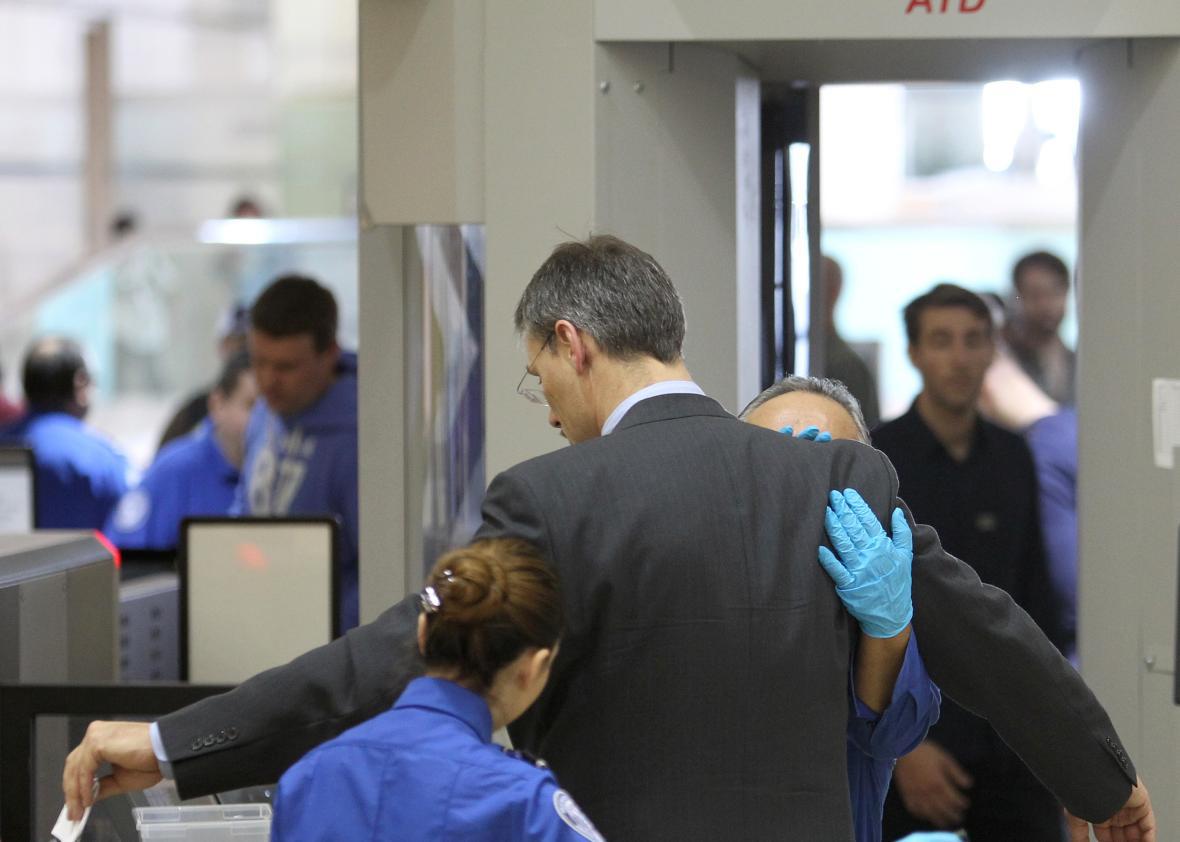Time was, our airports were kind of like malls, each with its own security team managed by airlines or local administrators. After 9/11, airplanes became the most highly secured public space in American life, and a new federal agency—the Transportation Security Administration—was created to implement uniform screening measures.
Following a month in which lines at security checkpoints were longer than the flights themselves, administrators at some of the country’s biggest airports are considering returning to private contractors to screen travelers and baggage.
The TSA says the delays have been caused by budget cuts that have left checkpoints understaffed while airports are busier than ever. Apparently, the agency had been expecting more Americans to sign up for Pre-Check, its expedited pre-clearance system—and had downsized accordingly. Earlier this month, Congress approved the TSA’s request for overtime pay and new staff. On Monday, the agency replaced its top security official.
Will that be enough to satisfy airport representatives? Officials in Atlanta, Chicago, New York, Charlotte, North Carolina, and Phoenix—five of the country’s busiest airports—have publicly expressed interest in hiring private security forces. Under the TSA’s Screening Partnership Program, which was established in 2004, airports can elect to transfer security responsibilities to private contractors through a bid process.
As of November 2015, 21 U.S. airports had privatized security screening, representing 5 percent of U.S. passenger volume. The biggest of those, San Francisco International Airport, is responsible for more than half of those passengers.
There’s no doubt the TSA has been both inefficient and ineffective. Department of Homeland Security agents have been sneaking weapons past screeners for years. Could a constellation of private security companies do better?
If the TSA were in charge of municipal garbage collection or offshore oil exploration, you might expect that privatizing its subsidiary branches would lead to innovative procedures, new technology, or an evolving set of best practices. Imagine: One airport might let passengers keep their shoes on, while another might let passengers bring water, wine, or shampoo on board.
Instead, even at airports where contractors perform screenings, the TSA mandates federal screening standards—which means that contracting would do little to mitigate the expensive, invasive, and slow practices that are handed down from Washington. (Truly abolishing the TSA in favor of local control, which Chris Edwards at Cato has convincingly proposed, hasn’t gained much traction, even among Republican foes of the agency. Besides, we might ask: What room is there to innovate in a field with no political tolerance for error?)
Rather, the benefits of privatization, as it’s currently being discussed, have more do to with ground-level labor management and less with, well, security.
In 2014, Mark VanLoh, the director of the Kansas City Aviation Department, spoke to Congress about the benefits of the Screening Partnership Program at Kansas City International Airport. They included the ease of reassigning workers, rescheduling shifts, and “dealing with non-performers”—i.e. firing people. But if such flexibility has led to measurably shorter lines per dollar, per employee, and per passenger, there’s little in the way of hard evidence.
For years, congressional Republicans and conservative think tanks have proposed contracting as a solution to long lines, which they see as a product of government bureaucracy. In 2012, GOP staffers at the House Transportation and Infrastructure Committee, then led by Florida Republican John Mica, prepared a report saying employees of Covenant Aviation Security at SFO cleared 65 percent more passengers per employee than their TSA counterparts at LAX. (Covenant was at that point headquartered in Mica’s district, and its then-president was a campaign donor.) The TSA, which had attempted to shut down the private screening program in 2011, saying it brought “no advantage,” disputed those findings.
Since then, the back-and-forth has continued. Most recently, a consultant hired by the TSA reported in 2014 that private contractors cost slightly less at large airports than TSA screeners but brought no improvements in efficiency or effectiveness. A 2015 review of that study by the Government Accountability Office reported that the TSA study had significant limitations.
There’s no national database of monthly security wait times, and in any case, the divergent layouts and responsibilities of the nation’s hundreds of commercial airports make head-to-head comparisons difficult. Last week, in lieu of the correct information, Time used flight delays as a proxy for security lines—and reported that SFO was the worst airport for travelers in the country.
Moving from TSA employees, who are part of the largest union for federal government workers, to workers at low-bid security firms would be a way to cut screening costs at airports. It would be bad news for airport workers. And it’s not going to put much of a dent in that three-hour security line at O’Hare.
If we really want to get travelers to the gate faster, it’s simply going to require more workers—or fewer security procedures.
